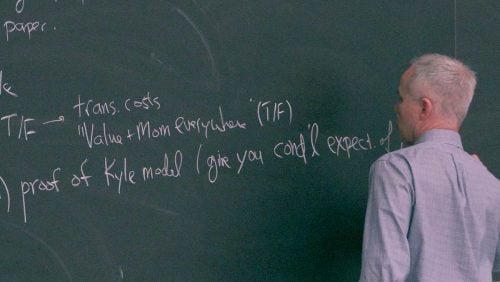Our program provides students with a deep understanding of today’s rapidly evolving economic and financial landscape and the advanced mathematical, statistical, and computational tools they need to lead in the financial industry.
| Application deadlines | December 15 for fall 2026 admission to receive an earlier review and faster admission decision.
|
| Average time to degree completion | Three to four full-time semesters |
| Tuition | $66,670 annually / $33,335 per semester |
| Funding support | More details here |
No GRE required, and no application fee.
What makes us unique?
-

A Culture of Collaboration
We benefit from scholarship from across the university, and particularly in the areas of business, finance, economics, computing, and management in the Carey Business School and from the Department of Economics in the Krieger School of Arts and Sciences, as well as from the other departments and programs in the Whiting School of Engineering.
-

The chance to specialize
We offer multiple research areas that allow you to tailor your studies to meet your professional goals.
-

The Hopkins network
Join us and you’ll be part of a worldwide network of alumni who are committed to your professional success.
About our program
Broad expertise
Classes are informed by our faculty’s extensive experience in the financial industry, as well as the expertise of faculty from JHU’s Carey Business School and Krieger School of Arts and Sciences.
Professional preparation
All students complete an industry internship, usually the summer after their first year.
Finance with the engineering advantage
Unlike other financial programs, ours is embedded in the Engineering School, giving you access to world-class scholars who are redefining the fields of machine and learning and data science.
We offer the courses students want
Explore our most popular master’s courses.
The Financial Math MSE student experience
Faculty
Meet the faculty teaching and mentoring our students and leading advances in the field Meet our facultyProgram Requirements
Prospective students for our graduate programs must have completed a Bachelor’s level degree, ideally in Engineering, Mathematics, the Sciences, Finance or Economics. In addition, candidates should ideally have completed undergraduate-level courses in
- Calculus, through multivariable calculus
- Linear algebra
- Differential equations
- Probability and statistics
- Microeconomics and macroeconomics
- Computer programming (e.g., in C++)
- At least two proof-writing courses
Admissions decisions are based on a review of all materials submitted by the applicant, with increased importance placed on the applicant’s mathematical course background, grades (GPA), and recommendation letters.
Outcomes-oriented
Our graduates are leaders in industry and entrepreneurs, working at the forefront of fields from aerospace, renewable energy, and bioengineering to government.
In 2024, the median salary in mechanical engineering was $102,000, with projected employment growth of 11% in the field by 2033.
Select professions obtained by our Financial Math MSE graduates include energy trader, consultant, product designer, software engineer, and robotics engineer.
| Select Employers | ||||||||
|
Imagine yourself here
Baltimore has so much to offer. From vibrant and diverse neighborhoods with affordable housing, a farmers' market, excellent restaurants and the Baltimore Museum of Art just blocks from campus to professional sports teams, a rich history and a lively culture scene, make Baltimore a great place to call home.
Ready to Apply?
Get the information you need about our application process and financial aid, or get your application started today!




